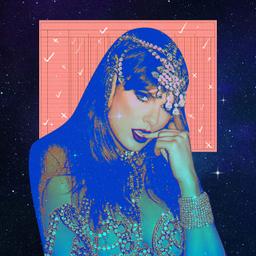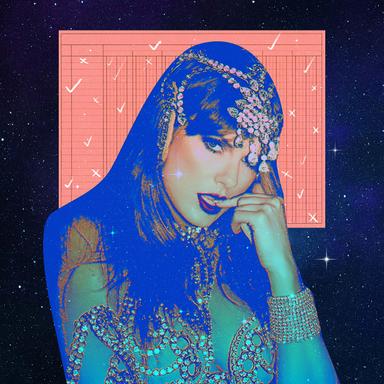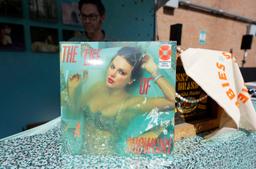Taylor Swift’s latest album, The Life of a Showgirl, suggests in its title an interest in artifice. The showgirl, clad in Bob Mackie sparkle in the album’s promotional photography, is a facade in feathers and fishnets. This is the final product of a showgirl onstage, whatever you want her to be, humanity blurred out by the glare of klieg lights.
It’s a compelling character for Swift to play. She’s the world’s most omnipresent entertainer, fresh off the glittering spectacle of the Eras Tour. But it’s also an awkward one. For decades, Swift has told her audience that what makes her show special is the way she cuts through the gloss to share the person behind all the razzle-dazzle. No amount of shimmer is supposed to blind the listener to the woman, who, when out of her Louboutins and lashes, wrote these stories of her own life experiences and chose to share them. It’s why I sometimes find myself wondering why other artists aren’t pausing between songs at their concerts to talk to me. It’s why identifying as a showgirl has never seemed to be important to Swift the way identifying as a songwriter has been.
Swift has spent the past two years more clearly defining herself as pop’s most ink-stained star. Her last album had her identifying as a tortured poet. Her engagement announcement with Travis Kelce was captioned: “Your English teacher and your gym teacher are getting married.” And even as she cast The Life of a Showgirl as a wholesale return to pop, she went out of her way to head off the idea that her reunion with producer Max Martin, who is typically far more concerned with melody and word economy than storytelling or turns of phrase, would decentralize her lyric writing. On her New Heights podcast appearance in August, Swift said that Martin told her, "I loved the storytelling on Folklore. I don’t want that to change just because we’re making these infectious anthems; I don’t want you to leave that behind.” To which she said, “I couldn’t if I tried.” Yet, even as Swift seems to hold her writerly identity closer than ever, her actual lyrics have never drawn more criticism.
Not since a short-lived conversation about Lover’s lead single, “ME!,” has the (thoughtful, well-reasoned) critical consensus about Swift’s work suggested that her writing might be getting worse. But that critique, which began to bubble up around 2024’s The Tortured Poets Department, is a prominent feature of the mixed reviews of her latest album. A New York Times piece lamented a flat reading of Hamlet as the framing for the lead single, “The Fate of Ophelia.” The New Yorker argued that the “weak lyricism in the Travis Kelce–inspired songs,” in particular, was to blame for stirring up a sexist and historically false argument that Swift can’t write well from a place of romantic stability. In The Guardian, Alexis Petridis wrote that “there’s no escaping the fact that comparing her partner’s knob to a magic wand constitutes weak writing from someone who made her name, at least in part, by being a sharper, wittier, more incisive lyricist than her peers.”
I don’t agree on all counts, but it’s a conversation that’s kept me thinking about Showgirl, the ways in which Swift’s lyrics have changed over time, and where she currently stands as a writer.
Swift’s superpower as a songwriter is specificity. It’s the way she can render an entire scene (“There’s glitter on the floor after the party / Girls carrying their shoes down in the lobby”) or a whole story (“You made a rebel of a careless man’s careful daughter”) in just a few lines. She has a knack for metaphor, crafting vivid and memorable phrases like “Loving him was like driving a new Maserati down a dead-end street” or “August sipped away like a bottle of wine.” In her earlier days, she fit these details into neat packages. Her pandemic albums, Folklore and Evermore, were a demarcation point where she began to write in a more florid, poetic style, but she still communicated a distinct meaning within the wordier phrasing.
Indeed, Swift often references Folklore when talking about how her writing has evolved. On that 2020 album, a critical darling and Grammy winner for Album of the Year, Swift leaned heavily into metaphor and used descriptive language and looser, less obviously biographical storytelling. One line she’s highlighted as a personal favorite from Showgirl, “I pay the check before it kisses the mahogany grain,” from “Father Figure,” does seem written with that same sepia-tinted quill pen that got a workout on both Folklore and Evermore.
But a lot of the writing on Showgirl is hyper-literal, in a way that seems like a continuation of her writing style on The Tortured Poets Department. There’s a stream of consciousness quality to that latter 31-song album as Swift weaves in and out of specific moments—crying at the gym or reacting to a partner placing a ring on her left hand—that I’m reminded of on Showgirl as she sets a scene at the Plaza Athénée in Paris or specifically references her partner’s ex being preoccupied by her phone. Both Poets and Showgirl have Swift using much more modern (although not always current) language, especially when she references the internet. But what these two most recent albums most clearly have in common, especially when compared with Folklore, is that their overt focus is the concept of Being Taylor Swift.
And as with Poets, a primary critique of Swift’s lyrics on Showgirl is their tendency to be “cringe”—whether she intended them to be or not. On Poets, she wrote stanzas like “You smoked, then ate seven bars of chocolate / We declared Charlie Puth should be a bigger artist” that often spilled out over bars of music. On Showgirl, the cringe is most visible in her embrace of mostly dated internet speak, like when she sings, “Did you girlboss too close to the sun?” on “CANCELLED!” or “I’m not a bad bitch / and this isn’t savage” on “Eldest Daughter” or describes a vacation that was “fuckin’ lit” on “Wi$h Li$t.”
I don’t take a universal view of these lines or, more broadly, of Swift using millennialisms in her writing; I have to look at each lyric on a case-by-case basis. On Poets, I find the Charlie Puth line to be both funny and a great encapsulation of the kind of rambling conversation you’d have with someone who’s constantly getting high, while the wedding ring lyrics on the title track come off as unnecessarily clunky. Another polarizing set of lines, “I’m having his baby / No, I’m not / But you should see your faces,” might be the best writing on Poets, for the tap-on-the-shoulder way it trolls Swift’s entire fan base.
There are moments on Showgirl that make me wonder whether Swift is trying to get a similar rise out of her audience. The use of the nonword “legitly” on the otherwise spritely title track must be a trap, tricking the grammar police into proving Swift’s point about people always finding something to criticize, right? But I’m less certain than usual that she’s in on the bit. On “Wi$h Li$t,” an apparent non sequitur about Real Madrid that builds to the “fuckin’ lit” lyric is sung against a modulating chord progression that indicates these are words she wants us to pay attention to, although I can’t figure out why.
Yet in its flourishes, The Life of a Showgirl has the ingredients of Swift’s best writing. There’s the perfect detail that colors a whole backstory in a few simple lines at the opening of “Opalite,” in which Swift shares that her brother used to describe her tendency to pine after exes as “eating out of the trash.” There’s the emotionally wrenching Act 3 reveal in “Ruin the Friendship” when Swift finds herself, well, pining after a high school crush, but with the added gut punch that the scene takes place at a grave site. There are metaphors (“Like a toy chihuahua barking at me from a tiny purse / That’s how much it hurts”) and elegant turns of phrase (“Shimmers that innocent light back”) and punch lines (“I would trade the Cartier for someone I could trust / Just kidding!”) and moments of incisive perception (“I’m immortal now, baby dolls”) that all stick. But these moments are fewer and farther between than usual, in a way that suggests that this was an album written on plane rides to and from Sweden during an exhausting world tour. But they are too present to use this album as evidence that Swift’s pen has dried up.
As for the cringe, well, it works when it works, and it doesn’t when it doesn’t. I get the sense that most of us are laughing along with her when she sings, “New Heights of manhood.” What better wedding present for a bro than to compliment his phallus and his podcast in a single line? And the lyric “I’m not a bad bitch” from “Eldest Daughter” doesn’t bother me, either—it rings true to me as Swift revealing that the tough exterior she embodied on “I Did Something Bad” and “Vigilante Shit” was a facade. The line “Pledge allegiance to your vibes” is not exactly the stuff of poetry, but could anyone argue against the notion that vibes play a major role in the Swift-Kelce relationship and, thus, this album?
I find myself less hung up on lyrics from The Life of a Showgirl that are a little corny than ones that don’t communicate a clear meaning. It’s not the random Real Madrid shout-out on “Wi$h Li$t” that bothers me but the inscrutable perspective. In the song, Swift is casting her desire for a simple life against a list of luxury items, some of which she already has—things that are being sought out by I’m not sure who. Influencers? Other WAGs? General society? The song “Eldest Daughter” eventually reaches a poignant conclusion about how love can chip away at the most hardened portions of one’s exterior, but it trivializes that point with an opening verse that’s mostly about internet comments. “The Fate of Ophelia” is relentlessly catchy, and I believe that its Prince Charming had his act together a lot more than Hamlet did. But I’d love to know more about the “powers” he spent so much time “honing,” unless I’m meant to seek out those answers on “Wood.”
More often than usual when dissecting a Swift album, I’ve found myself not entirely sure what she is trying to say with these songs. The highlights here from a writing perspective—“Elizabeth Taylor,” “Father Figure,” “Ruin the Friendship,” “Actually Romantic”—are the tracks where her point of view is most clear, which allows for her signature lyrical precision.
Maybe fuzziness throughout the rest of the album is simply a by-product of pace. Swift has released more than 100 new original songs since 2020 and 43 in the past 18 months, in addition to playing 149 shows since the Eras Tour launched in March 2023. Or maybe it’s that her life has grown increasingly rarefied and cloistered. Or that she has a desire to close off some aspects of her life to protect a serious relationship that’s still somewhat new.
If there’s tension between Swift the showgirl and Swift the songwriter, could it be because she made one of her more plainly autobiographical albums in a moment when she’s interested in hiding behind the veil of showmanship? Right now, the lyric from The Life of a Showgirl that’s sticking with me is, maybe accidentally, among its most insightful. “You don’t know the life of a showgirl,” she sings on the title track. “And you’re never, ever gonna.”






